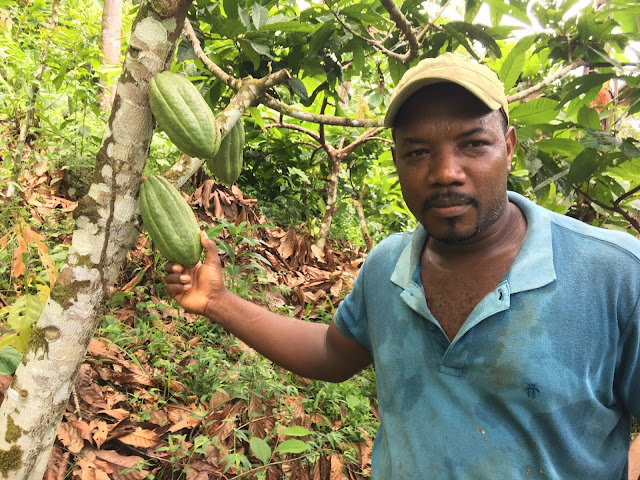The harvest is increasing
When he saw the crowds, he had compassion for them. – Matt. 9:36
Five miles down river from Istmina near the village of
Chiquichuqui, Luis Norberto and Gladys Musquera farm three hectares of land.
Though Luis is one of nine children in his family, he is the only one of his
family farming their ancestral land.
Luis grows a variety of crops including yucca, plantain,
fruit and two kinds of fish, but the crop he hopes will soon become his primary
source of income is cacao.
Through a project with MCC, the Mennonite Brethren
churches in the region are encouraging farmers to grow cacao, the source for
cocoa and chocolate, rather than coca from which cocaine is produced.
So far, 85 farmers in the region have agreed to plant cacao.
It was slow going at first. Farmers feared the armed groups that profit from
illicit drugs and producing coca can be profitable. Plus, growing the
alternative crop of cacao takes more time – almost two years until the first crop
can be harvested and nearly five years until the crop reaches full harvest.
At the Jerusalem MB church in Istmina, Nelly Mosquera
tells us that Jesus had compassion on the people and responded to their needs. The
harvest is plentiful, but the laborers are few, she quotes from the Gospel of
Matthew. Her husband, Pastor Fernando Merano, tells us the MB churches want to
work with the vulnerable in the community.
Nelly shares about a new project with MCC in response to
the peace accord in Colombia which has not brought the anticipated peace to the
Choco. Other military groups are now vying for power in the region instead. In
response, these churches are going into the communities to teach about peace,
forgiveness and reconciliation.
The MB churches have formed a foundation to encourage
farmers to grow rice and cacao instead of coca. The churches are also
responding to the growing number of displaced people because of increased
flooding in the region, especially in the more remote villages, at least partly
a result of mining efforts by outside parties.
We met with church and community leaders in the village
of Suruco where the Sinai MB church, with MCC’s help, was able to respond last
fall to the worst flooding in the region in nine years. “This is one of the
first times we got help,” a woman from the community council tells us.
The flood waters rose as high as the pulpit of the church
which is situated on the highest point in the community. “There was no place to
escape from the water,” another leader tells us. Food, mattresses, clothing and
kitchen items were distributed to community members most in need, regardless of
their church affiliation.
Luis, the farmer in Chiquichuqui, expects to produce more
than 1,000 kilos of cacao this year. He is more than a third of the way to his
goal of 1,000 kilos per hectare. Each kilo of cacao is worth about 4-5,000
pesos ($1.50 U.S.) Because of his increased income, Luis has already been able
to send his son to the university. And there is the future hope of directly exporting
cacao from the region out of Colombia if the farmers can increase their
quantity and quality of cacao. Exporting would increase Luis’ profit margin significantly.
Back at the Jerusalem MB church in Istmina, Nelly Mosquera
told us that Jesus proclaimed the good news of the kingdom and so should his
followers. Here in the Choco, the harvest is plentiful and the laborers are
increasing.
J Ron Byler is
executive director of MCC U.S.








Comments
Post a Comment